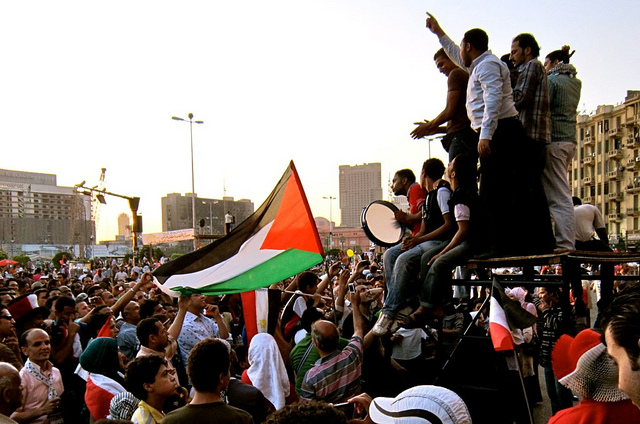Free, Free Palestine: The History and Implications of Israeli Occupation

Photo by Gigi Ibrahim
As Palestine Awareness Week — an informative celebration of the Palestinian people and advocacy for their rights — comes to an end here at UCLA, we must remember the importance of maintaining open dialogue. Facilitating the movement for Palestinian freedom will take more than one week, and it starts with education.
UCLA’s chapter of Students for Justice in Palestine (SJP) serves to promote awareness “centered on freedom, justice, and equality for the Palestinian people.” In Nov. 2018, SJP at UCLA hosted the National SJP Conference, and a few weeks ago, SJP hosted Palestine Awareness Week. In January 2019, Angela Davis and Common discussed several global issues, including Palestinian liberation. While attending these campus events supports Palestinians’ movement for self-determination, we must also acknowledge the history of Israeli apartheid.
According to Jewish Voice for Peace, the Israeli-Palestinian conflict “is often falsely presented as a conflict between two equal sides with irreconcilable claims to one piece of land.” Presenting the conflict as such poses a misrepresentation of the power dynamics between the two groups, one being Israel, a nation-state with “one of the world’s most powerful and well-funded militaries” and the other, “an indigenous population of Palestinians that has been occupied, displaced, and exiled for decades.” Amnesty International elaborates on the occupation and displacement of indigenous Palestinians, noting that the Israeli government has been banishing Palestinians from their land to establish settlements for Jewish people since 1948. The homes and lives of entire Palestinian communities have been destroyed. In addition, they’ve experience restricted movement and limited access to their own water and natural resources, all on top of violent attacks from the Israeli military and settlers.
Almost all foreign governments exacerbate the problem by contributing to and supporting the Israeli economy through trade of goods produced on colonized land, encouraging the expansion and creation of more Israeli settlements. According to Amnesty International, 50 years of settlement has restricted the movement of approximately 4.9 million Palestinians and destroyed over 50,000 Palestinian homes. Over 600,000 Jewish Israeli settlers colonize the land, of which around 100,000 hectares of land have been taken from Palestinians since 1967.
As Israeli occupation continues to dominate, it impacts the lives of Palestinian people in many ways. In the article “10 Things Palestinians Can’t Do Because of the Israeli Occupation,” HuffPost author Adam Hamze notes that “the occupation affects almost every aspect of Palestinians’ lives in the West Bank, the Gaza Strip and East Jerusalem.” The Israeli government and military dehumanizes Palestinians, from constantly surrounding them with a military presence to depriving them of control over their water sources to blocking access to certain healthcare procedures in their region.
We must work to counter these human rights violations by telling our governments to stop buying goods — an act that stimulates growth in the economy — from settlements beyond the Green Line. Furthermore, supporters of Palestine must also be careful in the organizations they choose to support, researching whether the money and resources offered by the NGO’s are truly benefitting the Palestinian people directly, rather than playing a performative role. Supporting Palestinian-led organizations, such as the International Solidarity Movement (ISM), is one of many actions that directly support the Palestinian people.
Having tough conversations encourages us to unravel issues previously considered unspeakable. Speak with — and more importantly, listen to — the Palestinian people. Spreading awareness, advocating and using our platforms of privilege to discuss Israel’s human rights violations, and helping the Palestinian people gain self-determination constitute some of the general goals of advocating for Palestinian rights. As a community, we must start to inform the general public about the implications of Israeli apartheid and standing in solidarity with Palestinian-led movements for self-determination.




